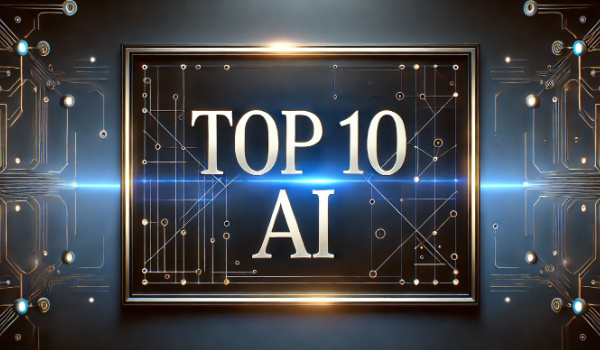Friends, the week of March 28 to April 3, 2025, witnessed significant developments in the field of artificial intelligence (AI). From corporate partnerships aiming to enhance customer experiences to legislative actions addressing the ethical implications of AI, these events highlight the pervasive influence of AI across various sectors.
And you all certainly know by now, AI has ABSOLUTELY gone mainstream, when you’re able to weave pizza into the top 10 news stories around artificial intelligence for the week. And the state of New Jersey has gotten into the scene as well with a new law criminalizing deceptive AI, a/k/a deepfakes.
Key Highlights:
- Papa John’s Partners with Google Cloud: Papa John’s International announced an expanded collaboration with Google Cloud to integrate AI into its pizza ordering processes, aiming to personalize customer interactions and streamline operations.
- New Jersey Criminalizes Deceptive AI-Generated Media: New Jersey enacted a law making it a crime to create and distribute deceptive AI-generated media, reflecting growing concerns over deepfakes and digital manipulation.
- Anthropic’s Fair Use Defense in AI Training Lawsuit: AI startup Anthropic argued that using copyrighted books to train its language model constitutes fair use, a case that could set a precedent for AI training practices.
Now let’s dig in……..
Top 10 AI Stories:
1. Papa John’s Collaborates with Google Cloud to Integrate AI in Ordering
Papa John’s International announced an expanded partnership with Google Cloud to incorporate artificial intelligence into its pizza ordering processes. The initiative aims to enhance customer experience by personalizing interactions, including push notifications, marketing emails, and loyalty offers based on past behavior. New features will include an online chatbot and ordering through virtual assistants. This move reflects a broader trend among fast-food chains leveraging AI to improve sales, customer service, and operations.
2. New Jersey Enacts Law Criminalizing Deceptive AI-Generated Media
As of April 2025, New Jersey has enacted a law making it a crime to create and distribute deceptive media generated using artificial intelligence, commonly known as deepfakes. The legislation imposes penalties of up to five years in prison for offenders and allows victims to pursue civil lawsuits. This move aligns New Jersey with at least 20 other U.S. states that have passed similar legislation targeting deepfakes related to elections or child sexual abuse imagery.
3. Anthropic Asserts Fair Use in AI Training Lawsuit
AI startup Anthropic has requested that a California federal court dismiss a lawsuit filed by authors alleging that the company violated their copyrights by using their works to train its AI language model, Claude. Anthropic argues that the usage of these works constitutes fair use because it’s transformative, utilizing the text to create a new form of technology rather than to replicate the authors’ original work. The case’s outcome could hinge on the application of the fair use doctrine, pivotal in several ongoing copyright disputes involving AI training across the tech industry.
4. Chinese Firms Invest $16 Billion in Nvidia’s AI Chips
In the first quarter of 2025, Chinese companies have ordered at least $16 billion worth of Nvidia’s H20 artificial intelligence chips, the most advanced models legally available to China under current U.S. export restrictions. Major tech firms such as ByteDance, Alibaba, and Tencent are leading purchasers of these chips, which are essential for AI applications due to their superior data-processing capabilities. Demand is significantly driven by Chinese startup DeepSeek’s AI models.
5. Microsoft’s Christopher Bishop Highlights AI’s Role in Scientific Discovery
Christopher Bishop, head of Microsoft’s AI for Science lab established in 2022, emphasized the transformative impact of artificial intelligence on scientific discovery. He explained how deep learning and large language models have revolutionized the pace and scope of research in fields like chemistry, physics, biology, and climate science. Bishop believes AI’s most significant contribution will be accelerating scientific breakthroughs that address critical global issues, such as drug discovery, energy development, and climate change mitigation.
6. Apple and Amazon Face Challenges in Delivering AI Promises
As of April 2025, Apple and Amazon have struggled to deliver on their promises of advanced generative AI features in their voice assistants, Siri and Alexa. Amazon unveiled Alexa+ in February with impressive demos, but the rollout has been extremely limited, with access restricted to a small group and many features missing from the initial release. Apple had announced significant Siri enhancements as part of iOS 18 but has since delayed key features. This pattern of overpromising and underdelivering has sparked skepticism and may undermine consumer trust.
7. U.S. Intensifies Scrutiny on TikTok Amid AI Competition with China
President Donald Trump has emphasized enhancing U.S. global dominance in artificial intelligence, with TikTok’s ownership by ByteDance—a leading Chinese AI company—emerging as an early test. ByteDance is pivotal to China’s AI ecosystem, boasting advanced technologies including recommendation algorithms, language models, and robotics. Washington’s policy shift toward accelerating AI growth while restricting China’s tech access has intensified scrutiny on TikTok. The administration has set an April 5 deadline for TikTok to be sold to a non-Chinese entity or face a ban, citing national security concerns.
8. ECWMF Develops Advanced AI Model for Wildfire Prediction
The European Centre for Medium-Range Weather Forecasts (ECWMF) has developed a new AI model for predicting wildfire risks. This model produces better results by incorporating more diverse data types than previous systems, demonstrating the importance of data quality and variety in enhancing AI predictive capabilities.
9. Algolia Unveils AI-Powered Collections for Enhanced Product Discovery
Algolia announced the launch of its AI-powered Collections feature, designed to improve product discovery by reducing choice overload and guiding users through intuitive navigation. This innovation aims to boost conversion rates, enhance inventory visibility, and improve SEO performance, reflecting the growing integration of AI in e-commerce platforms.
10. European Union Announces €1.3 Billion Investment in AI and Cybersecurity
The European Commission has unveiled a €1.3 billion investment plan targeting advancements in artificial intelligence, cybersecurity, and digital skills as part of the Digital Europe Programme for 2025 to 2027. Henna Virkkunen, the European Commission’s digital chief, emphasized that this initiative aims to bolster European technological sovereignty by investing in cutting-edge technologies and enhancing digital competencies among citizens. This substantial funding reflects the EU’s commitment to strengthening its position in the global tech landscape and addressing emerging digital challenges.
These developments underscore the rapid evolution of AI and its expanding influence across various sectors, from corporate operations and legal frameworks to international investments and scientific research.
Content provided by DWN’s team with the assistance of ChatGPT






